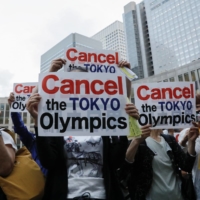The Tokyo Olympic torch relay will be taken off public roads in most parts of the Japanese capital during the first eight days after the segment begins next week, the metropolitan government said Tuesday, amid signs of a rebound in COVID-19 infections.
Organizers will not hold the relay on public roads in Tokyo, excluding its small island areas, between July 9 and 16, as part of measures to prevent the spread of the coronavirus, according to the metropolitan government.
The Tokyo leg of the relay will begin after the flame has passed through 46 of the country’s prefectures, with the pandemic already forcing many other areas to scale down their programs and not allow runners to pass the flame on the streets of their municipalities.
Tokyo, which had been under a COVID-19 state of emergency for about two months since late April, is now under a lighter quasi-state of emergency, due to end July 11.
However, since the third state of emergency ended on June 20, Tokyo has seen rising daily coronavirus cases, adding to concerns that the Olympics, set to begin July 23, could trigger a spike in infections.
The organizers are expected to decide at a later date a format for the relay from July 17 until the opening ceremony of the Olympics.
Uncertainty remains about whether the quasi-state of emergency can be lifted as planned. If the measure is extended or another state of emergency declared, the organizers may need to make further changes to the second half of the 15-day leg of the relay in the capital.
Last Wednesday, Tokyo reported 619 new infections — the highest figure in about a month — and confirmed 476 more cases on Tuesday.
For the first eight days, the relay was scheduled to take place mainly on the islands as well as the Tama area in the western suburbs of the capital’s central part.
As a result of Tuesday’s decision, over 600 runners will not be able to run on public roads. They are instead set to participate in a flame lighting ceremony at the final destination of each day.
“We have prepared with the hope of having people run on public roads, so it is really unfortunate,” a Tokyo official said. “It is important to connect the flame, and we would like to have the event finish with smiles on people’s faces.”
Before the start of the 121-day relay in late March, about 10,000 runners were initially set to carry the Olympic flame in the country’s 47 prefectures.
But many of them ended up having to pass on the flame in parks and other designated areas devoid of spectators in so-called torch kiss ceremonies.
In Tokyo and many other parts of the country, all mass public viewings of this summer’s Olympics and Paralympics have already been canceled as well as part of precautions against the virus.
Despite repeated pledges by the Japanese and metropolitan governments, and the International Olympic Committee to stage the games safely with anti-COVID measures, public skepticism about the massive sporting event during a global health crisis remains strong.
In a time of both misinformation and too much information, quality journalism is more crucial than ever.
By subscribing, you can help us get the story right.
SUBSCRIBE NOW



